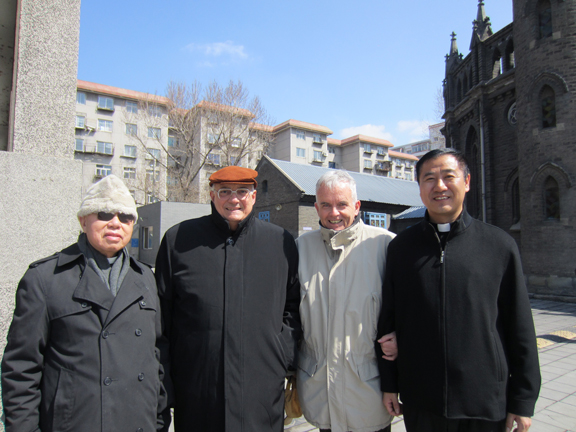
China is undergoing massive growth, and buildings and towers are springing up all throughout the country. It is a modern society, but it is still a country of the East, and I was very fortunate to have Msgr. Joseph Chiang as my traveling companion. He is an 83-year-old priest who was born in FuZhou City; he fled when he was 18 on the last boat out after the communist takeover, which took him to Hong Kong. He became a Dominican priest and later left that order to join the Archdiocese of Newark, N.J., where I had the privilege to serve with him in the same parish at the very beginning of my priestly ministry. Msgr. Chiang has been a long-time friend and trusted advisor of the situation in his homeland.
Msgr. Chiang has guided my understanding of the place of the Church vis-à-vis the Chinese government. In general, the situation between the registered and unregistered churches includes the issue of ordination of bishops. The government wishes to control any church or organization that exists in that country. Whereas they do not have a democratically elected government, the government does believe that bishops should be elected by the people and not chosen by the foreign state of Vatican City. This, unfortunately, is a misunderstanding of the nature of the Church.
Difficult Relations with Vatican
The issue of diplomatic relations between the Vatican and China has always been difficult. Usually, the issue presented by the government is a recognition of Taiwan as a separate country. This is a complex issue which has had its ups and downs over the years. Many efforts have been made, I believe, by the Holy See, however, clearly there is a lack of appropriate personnel to engage in these complex negotiations.
Msgr. Chiang is well known in his hometown. Through his hard work and the hard work of others, there has been some rapprochement between the registered and unregistered churches. All respect him as a native son, and his wisdom of 83 years makes a difference in the Chinese culture. Several years ago in his home city, he asked a local provincial religious authority to intervene in the renovation of the almost 100-year-old cathedral and a relic of the missionary work by the Dominican Fathers in FuZhou. The structure is impressive and sits on the banks of the river. Through Msgr. Chiang’s intervention, progress has been made in its renovation, not only as a historical monument but also for use by the registered church.
A new diocesan center has been built next to the church, and the renovation of a house for a bishop is underway, but it has not been officially used in FuZhou for almost 15 years. The apostolic administrator is from another diocese, who is 94 years old, and is unable to really exercise any governance of this diocese. While in FuZhou, we traveled by car for three hours to Amoy. Here Bishop Cai Bing Rui is 42 years old, one of the youngest bishops in the world, and certainly in China. He was ordained with Vatican approval, which makes him the only bishop in the Fujian Province recognized by the Vatican. Bishop Cai Bing came to FuZhou City, and we met with the regional director of religious affairs over dinner, which proved to be a fruitful meeting.
To illustrate the differences between the registered and non-registered churches, we visited a shrine one hour’s drive from FuZhou called Rosary Hill. This is a beautiful shrine run by the unregistered church with 10 sisters in residence. This large tract of land was given to the diocese by the current president of China, who at the time of the gift was the governor of the province. Perhaps this bodes well for the future, since it shows his recognition of the needs of the Church and seemed to be attentive to fulfilling those needs.
The Chinese are a very proud people. We must pray for the Church in China and its maturation as it faces complex challenges. In my limited experience, it seems that the Church is on the right path for development and growth.
We can learn a lesson from the Chinese here in the Diocese of Brooklyn, where over 400,000 Chinese live in our midst. We must put out into the deep and take up the work of the New Evangelization, for just as the Church in China experiences tension and challenge, so too do we in our own diocese, and we must face those same challenges with faith.
My dear brothers and sisters in the Lord,
